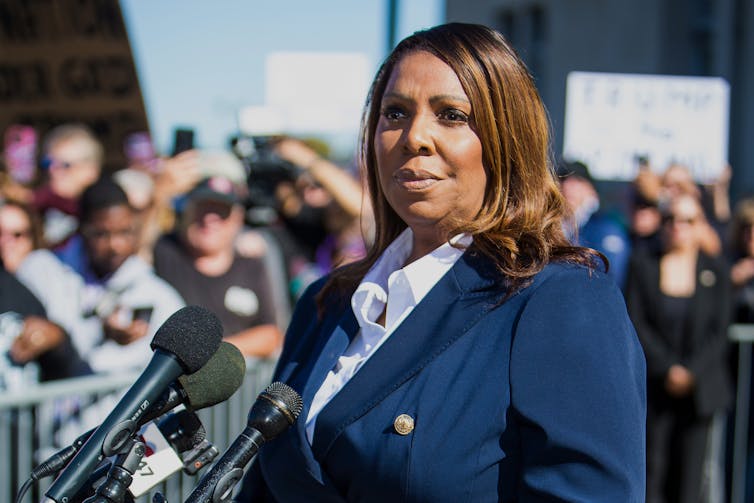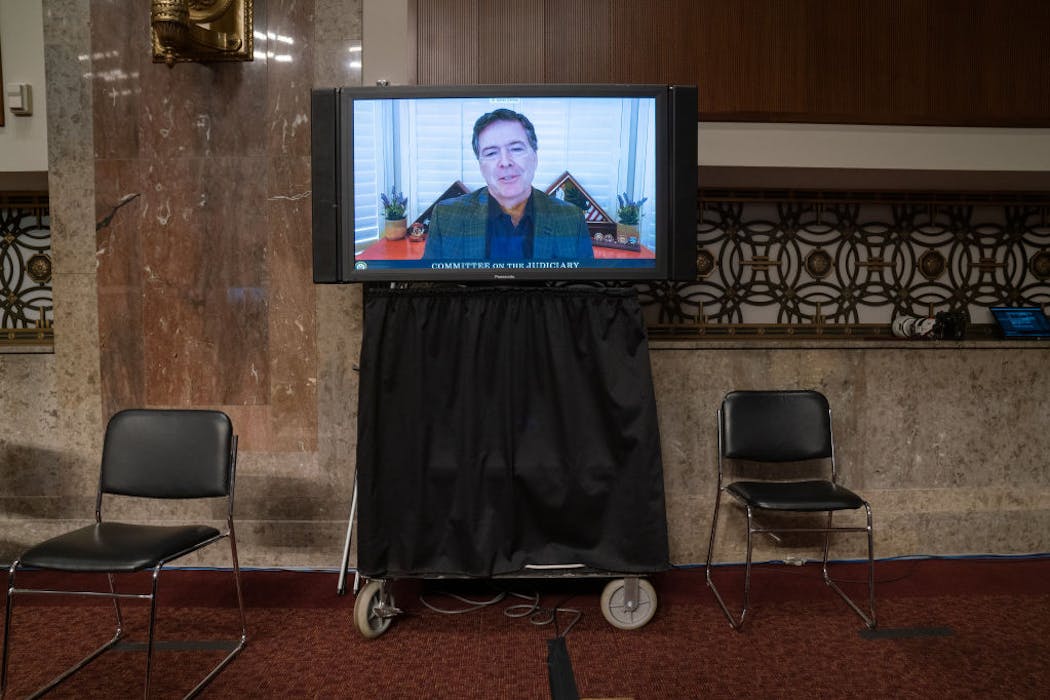- Home
Edition
Africa Australia Brasil Canada Canada (français) España Europe France Global Indonesia New Zealand United Kingdom United States Edition:
Global
Edition:
Global
- Africa
- Australia
- Brasil
- Canada
- Canada (français)
- España
- Europe
- France
- Indonesia
- New Zealand
- United Kingdom
- United States
 Academic rigour, journalistic flair
Academic rigour, journalistic flair
 Former FBI Director James Comey is sworn in remotely at a hearing of the Senate Judiciary Committee in Washington on Sept. 30, 2020.
Ken Cedeno-Pool/Getty Images
‘Without prejudice’: What this 2-word legalese means for the dismissed charges against James Comey and Letitia James
Published: November 25, 2025 4.14pm GMT
Ray Brescia, Albany Law School
Former FBI Director James Comey is sworn in remotely at a hearing of the Senate Judiciary Committee in Washington on Sept. 30, 2020.
Ken Cedeno-Pool/Getty Images
‘Without prejudice’: What this 2-word legalese means for the dismissed charges against James Comey and Letitia James
Published: November 25, 2025 4.14pm GMT
Ray Brescia, Albany Law School
Author
-
 Ray Brescia
Ray Brescia
Associate Dean for Research and Intellectual Life, Albany Law School
Disclosure statement
Ray Brescia does not work for, consult, own shares in or receive funding from any company or organisation that would benefit from this article, and has disclosed no relevant affiliations beyond their academic appointment.
Partners
View all partners
DOI
https://doi.org/10.64628/AAI.ywcpuuhdn
https://theconversation.com/without-prejudice-what-this-2-word-legalese-means-for-the-dismissed-charges-against-james-comey-and-letitia-james-270559 https://theconversation.com/without-prejudice-what-this-2-word-legalese-means-for-the-dismissed-charges-against-james-comey-and-letitia-james-270559 Link copied Share articleShare article
Copy link Email Bluesky Facebook WhatsApp Messenger LinkedIn X (Twitter)Print article
A federal judge on Nov. 24, 2025, dismissed the indictments against former FBI Director James B. Comey and New York Attorney General Letitia James, blocking the Department of Justice’s efforts to prosecute two of President Donald Trump’s perceived adversaries.
But U.S. District Judge Cameron McGowan Currie qualified her dismissals, saying she did so “without prejudice.”
What does that legal term mean?
Unaddressed charges
In her ruling, Currie concluded that the appointment of interim U.S. Attorney Lindsey Halligan, who filed the cases against Comey and James, was unlawful. Currie wrote:
“Because Ms. Halligan had no lawful authority to present the indictment, I will grant Mr. Comey’s motion and dismiss the indictment without prejudice.”
She wrote the same about the case against James.
Currie’s “without prejudice” reference means the dismissal did not address what legal scholars like me call the merits or substance of the underlying criminal charges.
A “without prejudice” dismissal is legalese for “you can try again if you can fix the problems with your case.” Had the judge ruled that the dismissals were “with prejudice,” that would have meant the government could not have brought the cases again.
Here’s what prosecutors would need to fix to be able to bring cases against Comey and James again.
Federal law provides that whenever a U.S. attorney’s position is vacant, the attorney general may appoint an interim U.S. attorney for a period of 120 days. At the end of that period, it’s up to the federal judges of the district where that position is vacant to appoint someone to continue in that role unless and until the president nominates, and the Senate confirms, a U.S. attorney through the normal appointments process.
 New York Attorney General Letitia James speaks outside U.S. District Court on Oct. 24, 2025, in Norfolk, Va.
AP Photo/John Clark
New York Attorney General Letitia James speaks outside U.S. District Court on Oct. 24, 2025, in Norfolk, Va.
AP Photo/John Clark
The Trump administration appointed Halligan’s predecessor, U.S. Attorney Erik Siebert, in that interim role in January 2025. And when the 120 days from his appointment lapsed, the district judges of the Eastern District of Virginia selected him to continue on in his interim role.
Currie found that when Siebert resigned after his reappointment, that did not empower the Trump administration to appoint a new interim prosecutor. The power still resided with the District Court judges. Because of that, Halligan’s appointment and her efforts to secure the Comey and James indictments were void.
The end of the beginning
The Department of Justice can certainly appeal these rulings and could get them reversed on appeal, or it could refile them after a new U.S. attorney is named in accordance with law.
It may be too late for the case against Comey, however, because the statute of limitations on those charges has already run out. As Currie noted in her Comey ruling, while the statute of limitations is generally suspended when a valid indictment has been filed, an invalid indictment, like the one against Comey, would not have the same effect on the statute of limitations.
That means the time has likely run out on the claims against the former FBI director.
If Currie’s rulings stand, the Justice Department can’t just file the cases again, with Halligan still in this role, unless the Trump administration follows the procedures set forth in the law for her proper appointment.
While this is not the beginning of the end for these prosecutions, it is, at least, the end of the beginning.
- New York
- US law
- FBI
- Donald Trump
- James Comey
- Trump administration
- US Attorney General
- Prosecution
- US federal law
- Letitia James
- US Justice Department
Events
Jobs
-
 Case Specialist, Student Information and Regulatory Reporting
Case Specialist, Student Information and Regulatory Reporting
-
 Lecturer in Paramedicine
Lecturer in Paramedicine
-
 Associate Lecturer, Social Work
Associate Lecturer, Social Work
-
 Lecturer, Communication Design
Lecturer, Communication Design
-
 Leading Research Centre Coordinator
Leading Research Centre Coordinator
- Editorial Policies
- Community standards
- Republishing guidelines
- Analytics
- Our feeds
- Get newsletter
- Who we are
- Our charter
- Our team
- Partners and funders
- Resource for media
- Contact us
-
-
-
-
Copyright © 2010–2025, The Conversation

 Case Specialist, Student Information and Regulatory Reporting
Case Specialist, Student Information and Regulatory Reporting
 Lecturer in Paramedicine
Lecturer in Paramedicine
 Associate Lecturer, Social Work
Associate Lecturer, Social Work
 Lecturer, Communication Design
Lecturer, Communication Design
 Leading Research Centre Coordinator
Leading Research Centre Coordinator



